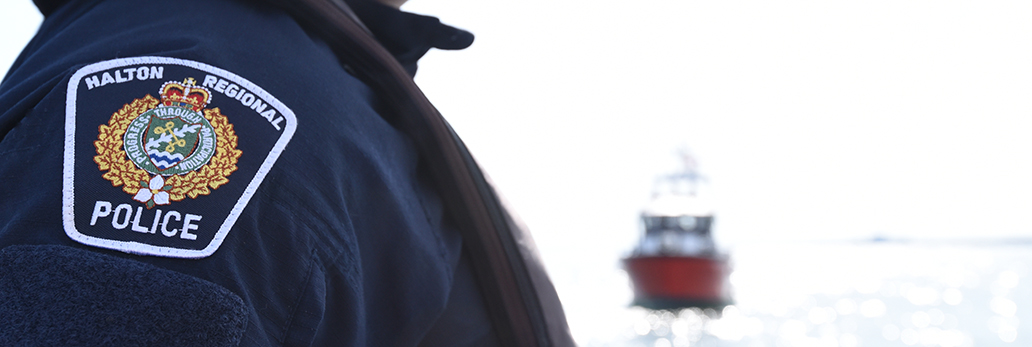
The Halton Regional Police Service (HRPS) is responsible for patrolling approximately 325 square kilometres of waters at the western end of Lake Ontario. Our priority is to ensure that all those who spend time on or near the water do so safely. Please review the following recommendations and do your part in helping keep our community safe.
Swimmers
- Please review all postings in relation to beach swimming. These are posted as precautions.
- None of the beachfronts in Halton region are monitored by lifeguards; swimming is at your own risk.
- There are no "swim-only" areas along the Lake Ontario shoreline. Please do your part to share the water.
- Ensure you don't "out-swim" or "out-float" your capabilities
- Keep an eye on the wind. It does not take much to push you offshore.
|
Water Safety Tips: Staying Safe on the Water |
|
1. Use Inflatable Toys, Kayaks, and Paddle Boards Responsibly
2. Wear a Personal Flotation Device (PFD)
3. Assess Your Swimming Skills
4. Follow General Water Safety Tips
5. Be Prepared
Additional LanguagesThe above tips are have been translated into the languages below: For more information, visit the Lifesaving Society’s website or contact your local police marine unit. Stay safe and enjoy your time on the water.
Halton Marine Unit Lifesaving Society |
Boaters
Before hitting the water, there are important safety items all vessels must have:
-
a Personal Flotation Device (PFD) or Lifejacket for each person onboard,
-
a sound signalling device,
-
a 15 meter buoyant heaving line, and
- a watertight flashlight (at night or if reduced visibility).
Before operating a vessel, remember:
- Do not operate a watercraft if you are impaired by drugs or alcohol.
- When operating near the shore, you must :
- yield the right of way to swimmers and sail-powered vessels,
- use caution when entering any swimming areas, and
- operate at a speed 10km/h or less within 30 meters of the shore.
- Do not over-drive your vessel.
Further equipment regulations are provided by Transport Canada's Office of Boating Safety website.
| Possible Offences for Vessels |
Criminal Code:
Small Vessel Regulation:
|
Drowning Prevention
Every year, approximately 500 Canadians die in preventable water-related incidents.
- When it comes to children, supervision is essential to preventing injuries and providing a fun but safe environment for them to enjoy the water. When supervising children in or near the water:
- Actively supervise, meaning eyes on the child/children at all times
- Stay within arms' reach. Every second counts.
- For adults, factors in water-related fatalities often include alcohol consumption and difficulty navigating changes in water current. Do not consume alcohol before or during swimming or boating activities
- When on a vessel, ensure everyone has a well-fitted life jacket on and fastened
- Drowning does not look like it does in the movies. Be on the watch for:
- climbing ladder motion
- head tilted back
- body vertical
- facing shore/lip of pool
- mouth at water level
- eyes glassy
Safety Videos
| Cold Water Survival |
|
When a person falls into very cold water, their body goes through a fairly predictable sequence in reaction to the submersion. Knowing the natural progression can help you react appropriately, giving you the best chance of survival. Watch this video to learn more: For additional water safety tips, visit the Lifesaving Society Water Safety web page. |
| Emergency Situations |
|
No one wants to find themselves in an emergency situation on the water. Knowing what to do in an emergency, however, could save your life. Watch this video to learn more about what to do in an emergency: |
| General Safety Tips |
|
All individuals who operate a boat have a responsibility to ensure a safe boating experience for themselves and everyone on board. Watch the video to learn valuable safety tips: |
| Impaired Boating |
|
Impaired boating IS impaired driving. If you are operating a watercraft, stay sober. Suspect that someone is impaired while operating a vessel? This a crime in progress: dial 9-1-1 immediately. Watch the following video to learn more about impaired boating: |
| Life Jackets |
|
Did you know that wearing a life jacket can prevent 90% of boat-related drownings? Life jackets save lives. "I can swim" is not enough. Watch this video to learn more about life jackets: Statistic provided by the Red Cross |
| Rules of the Water |
|
Understanding the rules of the road is essential for driving a car. There is no difference when it comes to boating. Watch the following video to learn more about the rules of the water: |
 I Want To
I Want To




 Subscribe to this Page
Subscribe to this Page